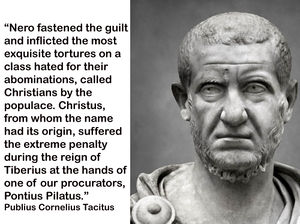Template:Jesus real

Historical Jesus
There are a lot of people that leap at the idea that he was completely made up and never existed. The scholar Bart Ehrman who has written a number of critical books on modern christian ideas and biblical interpretations into a scholarly context of history says people who suggest that Jesus never existed "Just make themselves look silly." But then he also said he is the same guy who said “The Christians did not invent Jesus. They invented the idea that the messiah had to be crucified.”
He wrote the book "Did Jesus Exist?" in which he wrote:
- “The problem then with Jesus is that he cannot be removed from his time and transplanted into our own without simply creating him anew.”[1]
The real problem is the more doctrines Christians invent the less they seem to know about the real Jesus and the less they know about the real Jesus the more they give the real Jesus a bad name.
Religious movements with no grounding in reality whatsoever are almost none existent. Yet thousands of people are dying and being persecuted, having their property seize and their bodies dismembered and even set on fire. That is a lot to expect from followers who had no Bible, no Churches and a supposedly made up founder.
Did any independent historian talk about Jesus?
Of course, Paul has two brief meetings with Jesus’ brother James. Since James’ existence could have been verified to the readers of Paul it would have been foolish to make him up.
Josephus was a Roman-Jewish historian who supposedly wrote the Testimonium Flavianum—an ‘early’ reference to Christ. Some, however, think it is fake. But Josephus’s works also include a much less known passage that is not disputed.
In Book 20 of his Antiquities of the Jews there is a clear reference to the execution of “the brother of Jesus, who was called Christ, whose name was James”.

Tacitus
Publius Cornelius Tacitus was a senator and a historian of the Roman Empire.
The Great Fire of Rome was talked about extensively by Tacitus who reported suspicions that the fire was set and then blamed on others who were already not very popular with Romans.
Tacitus wrote:
“Nero fastened the guilt and inflicted the most exquisite tortures on a class hated for their abominations, called Christians by the populace. Christus, from whom the name had its origin, suffered the extreme penalty during the reign of Tiberius at the hands of one of our procurators, Pontius Pilatus.”
Was there archaeological evidence that Christ existed?
What is the meaning of archaeological evidence?
The archaeological record is the body of physical (i.e. not written) evidence about the past. It is one of the core concepts in archaeology, the academic discipline concerned with documenting and interpreting the archaeological record.
What we usually call archaeological record are usually found in the ground. What would you expect to find as an archaeological record of Jesus?
We know that James was Jesus brother and that he lived and we appear to have found his bone box. The Ossuary or bone box immediately came into question and the Israeli police arrested the collector who found Ossuary on the suspicion of forgery. But the case was thrown because those experts who were making these accusations were evidently lying and the inscriptions appear to be authentic.
The Ossuary or bone box of Caiaphas the high priest was also found containing bones and for some unknown reason also contained three spikes that could have been used in a crucifixion.
There are apparent discrepancies in the book we call the Bible but these do not affect the message of the Gospel. The ancient prophecy saying the Messiah would be born in Bethlehem begs why was he from Nazareth in Mark and only later from Bethlehem in Luke and Matthew.
Jesus's Mother having stayed in Bethlehem during the birth may make Jesus a prophetic anchor baby but he would still be from the polis of Nazareth. Even Herod Antipas' Mother went to Bethlehem to give birth to little Herod just so he could improve his claim to the throne.
- ↑ Bart D. Ehrman, Did Jesus Exist?: The Historical Argument for Jesus of Nazareth